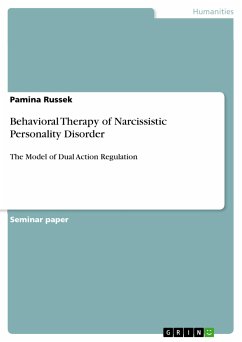Seminar paper from the year 2011 in the subject Psychology - Clinical Psychology, Psychopathology, Prevention, grade: 1,3, , language: English, abstract: The narcissistic personality disorder is characterized by a lack of self-confidence and rejection of one's self inwards, alternating with an exaggerated and extremely pronounced self-confidence outwards. Hence, such a person is always striving for admiration and acknowledgement, while giving little real attention to other people. She/he has an exaggerated sense of importance, hopes to attain and to earn special status. She/he exhibits exploitative attitudes and a lack of empathy. Delusional disorders with concepts of grandness are within the spectrum of possibilities. Moreover, the afflicted shows a striking sensitivity towards criticism, which often is projected globally, stirring feelings of rage, shame, and humiliation. The term "personality disorder" by itself is hazy and subject to controversy. It is not just a standardized, empirically validated theory that is missing but likewise a sound therapy for the effective treatment. Furthermore, clients with personality disorders are considered as therapeutically little accessible and difficult on an interaction level. Prof. Rainer Sachse, psychology professor at the University of Bochum and founder of the "Klärungsorientierte Psychotherapie" (clarification-oriented psychotherapy) and of the dual action regulation model, does not talk about personality disorders anymore, but instead of relationship and interaction disorders. Herewith the therapist takes on an equally important role, as does the client. Moreover, he assumes that the forms of relationship, which taken to the extreme lead to the so-called personality disorders, are universal behavior in their milder expression (Sachse, 2006). For a better understanding of the subject, the present work first discusses the theory of clients with narcissistic personality disorder and subsequently elaborates on the possibilities for intervention. In the light of the model of dual action regulation, central motives, schemata, and strategies of action are pointed out, that are displayed by clients with narcissistic PD. Therapeutic strategies like complementary structuring of relationships, confrontation, schema modifications are being deduced.
Bitte wählen Sie Ihr Anliegen aus.
Rechnungen
Retourenschein anfordern
Bestellstatus
Storno









